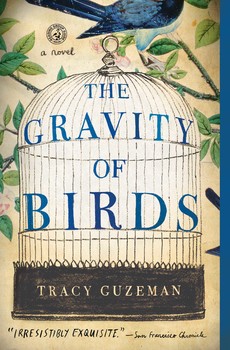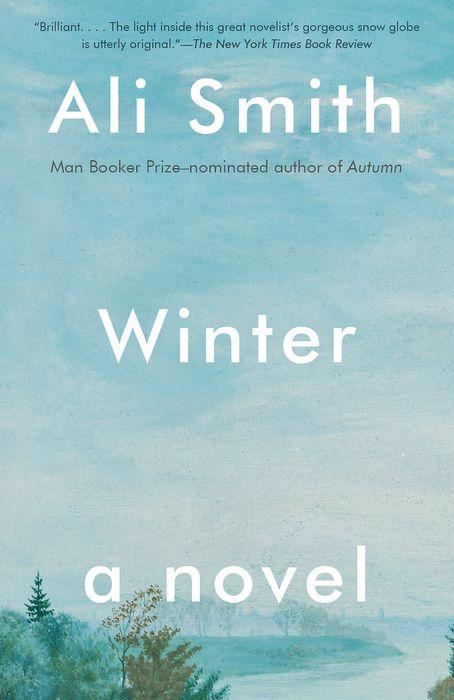Some people read for the story. Some read for the good company. Me, I often read for the inspiring poetic language. I never cease to be astounded by an author who weaves words together into a breathtaking piece of art. The most impactful prose will stop me in my tracks. I will read it over and over. I’ll dog-ear the pages and scribble notes in the margins. Writing is a brilliant craft, and I love to witness the unbelievable talent authors put into their work. Here are seven gorgeous novels, wrapped in stunning prose, for readers who, like me, enjoy lofty language.

7 Lyrical Stories That’ll Take Your Breath Away
Hadi and Sama are a young Syrian couple, who both migrated to the U.S., years apart, in hopes of a better life. Now, with a son on the way, in Boston, the two are eager to raise their child in a free land. But when Hadi’s father dies back in Jordan, Hadi must return to his homeland. Though Hadi promises to return in a few days, as time trudges on, Sama hears nothing from her husband and winds up waiting for him with building dread at the airport. Worlds apart, the couple survives on hope, though despair threatens to break through at every turn. This story is a breathtaking, lyrical, absorbing, and poignant read.
Exit West meets An American Marriage in this breathtaking and evocative novel about a young Syrian couple in the throes of new love, on the cusp of their bright future…when a travel ban rips them apart on the eve of their son’s birth—from the author of the “absorbing page-turner” (People) The Girls at 17 Swann Street.
Hadi and Sama are a young Syrian couple flying high on a whirlwind love, dreaming up a life in the country that brought them together. She had come to Boston years before chasing dreams of a bigger life; he’d landed there as a sponsored refugee from a bloody civil war. Now, they are giddily awaiting the birth of their son, a boy whose native language would be freedom and belonging.
When Sama is five months pregnant, Hadi’s father dies suddenly in Jordan, the night before his visa appointment at the embassy. Hadi flies back for the funeral, promising his wife that he’ll only be gone for a few days. On the day his flight is due to arrive in Boston, Sama is waiting for him at the airport, eager to bring him back home. But as the minutes and then hours pass, she continues to wait, unaware that Hadi has been stopped at the border and detained for questioning, trapped in a timeless, nightmarish limbo.
Worlds apart, suspended between hope and disillusion as hours become days become weeks, Sama and Hadi yearn for a way back to each other, and to the life they’d dreamed up together. But does that life exist anymore, or was it only an illusion?
Achingly intimate yet poignantly universal, No Land to Light On is the story of a family caught up in forces beyond their control, fighting for the freedom and home they found in one another.
Forty-four years have passed since artist Thomas Bayber, now a famous painter, met the Kessler sisters in the summer of 1963. With all the time that has passed, he feels it’s time to unveil a provocative painting of the girls that he painted when the sisters were teens. Now, before he attempts to sell his work, Thomas must first find the sisters, who have miraculously disappeared. This gorgeously written debut novel ties three characters together, with irresistibly poetic language, to demonstrate the complexity of families and the drama of relationships.
Ali Smith’s Seasonal Quartet is a favorite series of lyrical prose of mine that I often turn back to. In the novel WINTER, Smith describes how the world shrinks. The plants have died, the nights are long, and the world lingers in frigid stillness. Winter teaches us about survival. And through Ali Smith’s prose, we are taught that even in the toughest of seasons, the warmth of memory and the strength of evergreens will see us through.
One of the greatest things about literature is that it provides a means of understanding. Xiomara, a Dominican American fifteen-year-old in Harlem, discovers this in the most beautiful way as she pours all her frustration and anger into poetry, which she scribbles in her leather-bound notebook. But with her mother’s urge to obey the laws of the church, Xiomara knows she could never share her thoughts publicly. That is, until she is invited to join her school’s slam poetry club. Although Xiomara knows she could never attend without her mother finding out, she still cannot stop thinking about her poems. THE POET X is a gorgeous read about following your passion, sharing your thoughts, and speaking your truth.
Bill Clegg’s prose in THE END OF THE DAY is written with poetic brilliance. This novel about the complicated bonds of friendships and the corrosive power of secrets captures an entire sixty-year span in the framework of one day. The lives of a retired widow, a new father, an old taxi driver, and two others—all told: Dana, Jackie, Lupita, Alice, and Hap—come together as secrets begin to be uncovered. The redemptive strength of forgiveness is gorgeously detailed through lyrical language.
Following his acclaimed New York Times bestseller Did You Ever Have a Family, Bill Clegg returns with a “delicate, deeply observed, and deftly crafted” (Nickolas Butler, author of Shotgun Lovesongs) second novel about the complicated bonds and breaking points of friendship, the corrosive forces of secrets, the heartbeat of longing, and the redemption found in forgiveness.
A retired widow in rural Connecticut wakes to an unexpected visit from her childhood best friend whom she hasn’t seen in forty-nine years.
A man arrives at a Pennsylvania hotel to introduce his estranged father to his newborn daughter and finds him collapsed on the floor of the lobby.
A sixty-seven-year-old taxi driver in Kauai receives a phone call from the mainland that jars her back to a traumatic past.
These seemingly disconnected lives come together as half-century-old secrets begin to surface. It is in this moment that Bill Clegg reminds us how choices—to connect, to betray, to protect—become our legacy.
“Written in lyrical, beautiful prose that makes even waking up seem like a poetic event” (Good Morning America), this novel is a feat of storytelling, capturing sixty years within the framework of one fateful day.
Marie and Simone are friends, immigrants (from France, following World War II), and now widows. They both live alone in New York, where they encourage each other to remain active and adventurous. The two attend a painting class, which introduces readers to several other characters in the novel. Through a chorus of smart voices, THE SUNKEN CATHEDRAL explores marriage, friendship, and the many facets of love. This moving, fascinating story reminds us how memory shapes our present, and how the present itself is so changed from the past.
From the highly acclaimed, bestselling National Book Award nominee, a “funny…beautiful…audacious…masterful” (J. Courtney Sullivan, The Boston Globe) novel about the way memory haunts and shapes the present.
Marie and Simone, friends for decades, were once immigrants to the city, survivors of World War II in Europe. Now widows living alone in Chelsea, they remain robust, engaged, and adventurous, even as the vistas from their past interrupt their present. Helen is an art historian who takes a painting class with Marie and Simone. Sid Morris, their instructor, presides over a dusty studio in a tenement slated for condo conversion; he awakes the interest of both Simone and Marie. Elizabeth is Marie’s upstairs tenant, a woman convinced that others have a secret way of being, a confidence and certainty she lacks. She is increasingly unmoored—baffled by her teenage son, her husband, and the roles she is meant to play.
In a chorus of voices, Kate Walbert, a “wickedly smart, gorgeous writer” (The New York Times Book Review), explores the growing disconnect between the world of action her characters inhabit and the longings, desires, and doubts they experience. Interweaving long narrative footnotes, Walbert paints portraits of marriage, of friendship, and of love in its many facets, always limning the inner life, the place of deepest yearning and anxiety. The Sunken Cathedral is a stunningly beautiful, profoundly wise novel about the way we live now—“fascinating, moving, and significant” (Ron Charles, The Washington Post).
The stream of consciousness narrative in THE APPOINTMENT, by Katharina Volckmer, bursts with lyrical prose. In this story, beautifully written and packed with a dark and humorous punch, one young woman describes her struggle with identity, sexuality, and shame. As the narrator details her sexual fantasies involving Hitler, the consequences of her overbearing mother, and the medicinal properties of squirrel tails, readers will be infatuated by this new author’s literary voice.
“Darkly funny.” —The Guardian * “Transgressive...incendiary.” —The New Yorker * “A furious comic monologue...with a disregard for propriety worthy of Alexander Portnoy.” —The New York Times Book Review * “Sexy, hilarious, and subversive.” —The Paris Review
A whip-smart debut novel in which a woman on the verge of major change addresses her doctor in a stream of consciousness narrative.
In a well-appointed examination in London, a young woman unburdens herself to a certain Dr. Seligman. Though she can barely see above his head, she holds forth about her life and desires, her struggles with national and sexual identity. Born and raised in Germany, she has been living in London for several years, determined to break free from her family origins and her haunted homeland. But the recent death of her grandfather, and an unexpected inheritance, make it clear that you cannot easily outrun your own shame, whether it be physical, familial, historical, national, or all of the above.
Or can you? With Dr. Seligman’s help, our narrator will find out.
In a monologue that is both deliciously dark and subversively funny, she takes us on a wide-ranging journey from Hitler-centered sexual fantasies and overbearing mothers to the medicinal properties of squirrel tails and the notion that anatomical changes can serve as historical reparation. The Appointment is an audacious debut novel by an explosive new international literary voice, challenging all of our notions of what is fluid and what is fixed, and the myriad ways we seek to make peace with others and ourselves in the 21st century.
Photo credit: iStock / Müge Ayma


















